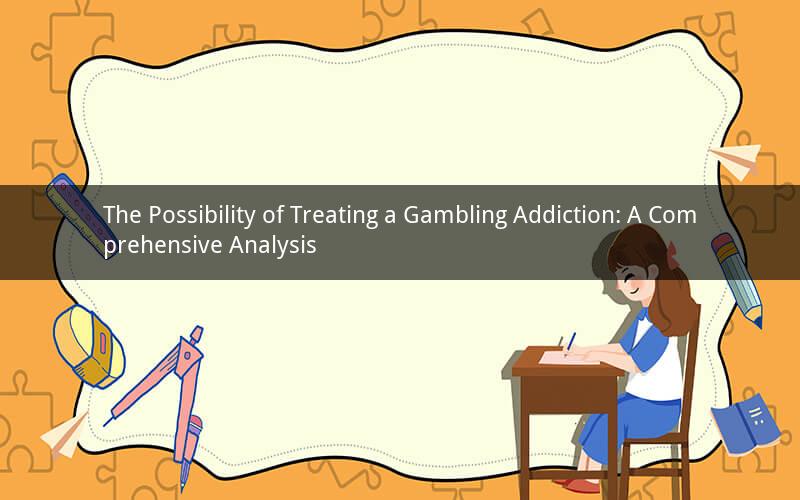
Introduction:
Gambling addiction, a form of addictive behavior, has become a significant concern in society. As more people engage in gambling activities, the number of individuals struggling with this addiction has increased. The question of whether a gambling addiction can be cured has become a burning topic. This article aims to explore the various aspects of treating a gambling addiction, including its causes, symptoms, treatment options, and the success rates of recovery.
Causes of Gambling Addiction:
Gambling addiction can be caused by a variety of factors, including genetic predisposition, environmental influences, and personal vulnerabilities. Genetic factors may contribute to the development of addictive behaviors, while environmental factors such as exposure to gambling opportunities and social influences can exacerbate the addiction. Additionally, individuals with certain personality traits, such as impulsivity and low self-esteem, may be more susceptible to developing a gambling addiction.
Symptoms of Gambling Addiction:
Identifying the symptoms of a gambling addiction is crucial for early detection and treatment. Common symptoms include preoccupation with gambling, increased spending on gambling activities, chasing losses, lying to loved ones about gambling habits, and neglecting personal responsibilities. Individuals with a gambling addiction often experience a sense of euphoria and excitement when gambling, which can lead to a cycle of repeated behavior.
Treatment Options:
Treating a gambling addiction requires a comprehensive approach that addresses both the psychological and environmental factors contributing to the addiction. Here are some common treatment options:
1. Cognitive-Behavioral Therapy (CBT):
CBT is a widely used therapeutic approach that helps individuals identify and change negative thought patterns and behaviors associated with gambling addiction. Through CBT, individuals can learn healthier coping mechanisms and develop strategies to resist the urge to gamble.
2. Medication:
In some cases, medication may be used to help manage the symptoms of gambling addiction. Antidepressants and mood stabilizers can help alleviate symptoms of depression and anxiety, which are often associated with addictive behaviors.
3. Support Groups:
Support groups such as Gamblers Anonymous provide a supportive environment for individuals struggling with gambling addiction. These groups offer a platform for sharing experiences, receiving encouragement, and learning from others who have overcome similar challenges.
4. Financial Counseling:
Financial counseling can help individuals manage their finances and overcome the financial consequences of gambling addiction. A financial counselor can assist in creating a budget, developing a plan to pay off debts, and implementing strategies to prevent future gambling-related financial problems.
5. Residential Treatment Programs:
For individuals with severe gambling addiction, residential treatment programs may be necessary. These programs provide intensive therapy, support, and a structured environment to help individuals overcome their addiction.
Success Rates of Recovery:
The success rates of treating a gambling addiction vary widely among individuals. Research suggests that the combination of therapy, support groups, and financial counseling can lead to long-term recovery for many individuals. However, it is important to note that recovery from a gambling addiction is a lifelong process, and individuals may experience relapses along the way.
Frequently Asked Questions:
1. Can a gambling addiction be cured completely?
Yes, a gambling addiction can be cured completely with proper treatment and support. Recovery from a gambling addiction is a lifelong process, but many individuals successfully overcome their addiction with the right tools and resources.
2. How long does it take to recover from a gambling addiction?
The length of time it takes to recover from a gambling addiction varies among individuals. Some may experience rapid recovery, while others may require ongoing treatment and support for years.
3. Can medication help cure a gambling addiction?
Medication can be used to manage the symptoms of a gambling addiction, such as depression and anxiety. However, it is not a cure for the addiction itself. Treatment typically involves a combination of therapy, support groups, and other interventions.
4. Are support groups effective for treating a gambling addiction?
Support groups can be an effective component of treating a gambling addiction. They provide a sense of community, encouragement, and practical advice from individuals who have overcome similar challenges.
5. Can a gambling addiction be prevented?
While a gambling addiction cannot be completely prevented, individuals can take steps to reduce their risk. This includes setting limits on gambling activities, avoiding triggers, and seeking help if they suspect they may be developing an addiction.
Conclusion:
Treating a gambling addiction is a complex process that requires a multifaceted approach. By understanding the causes, symptoms, and treatment options, individuals can take the necessary steps to overcome their addiction and achieve long-term recovery. With the right support and resources, a gambling addiction can be cured, allowing individuals to rebuild their lives and move forward with newfound freedom and control.